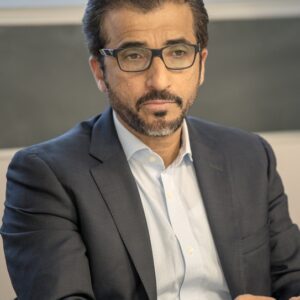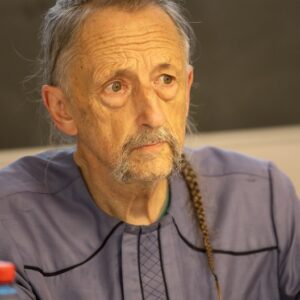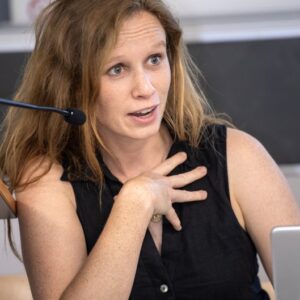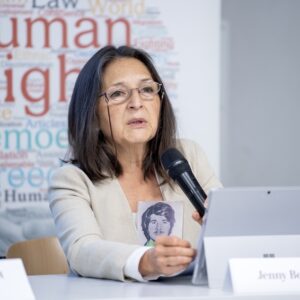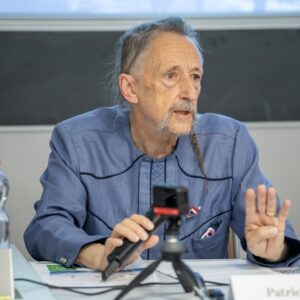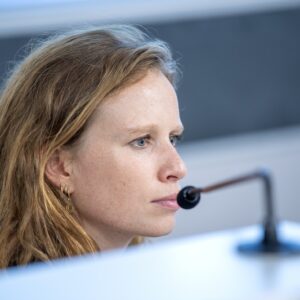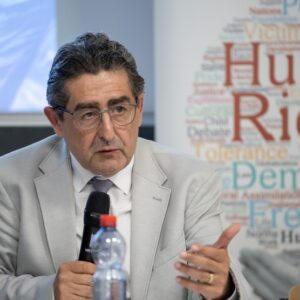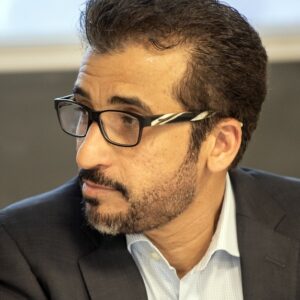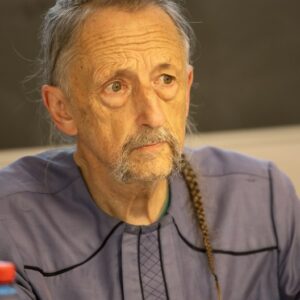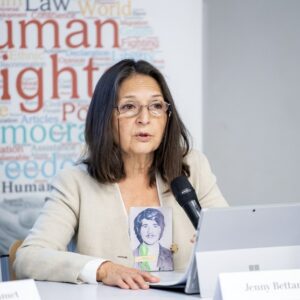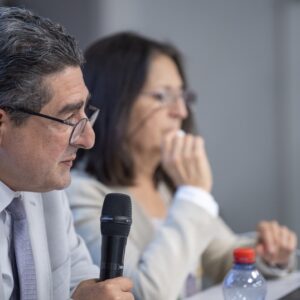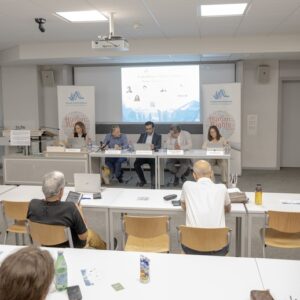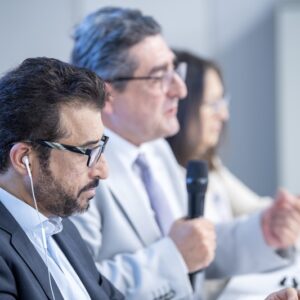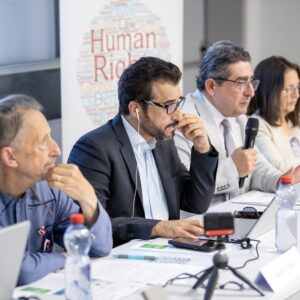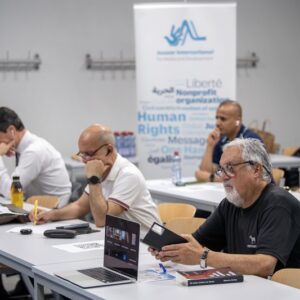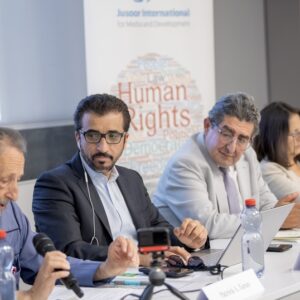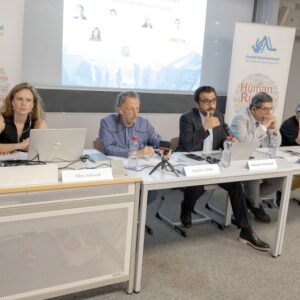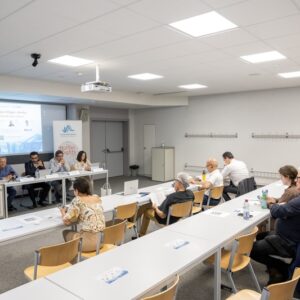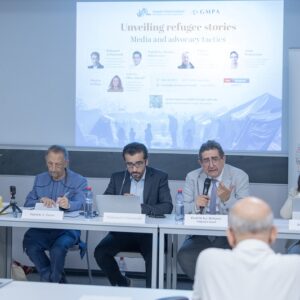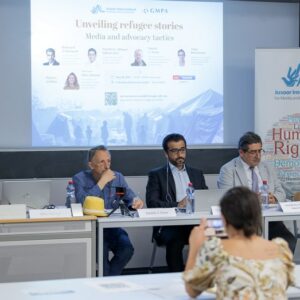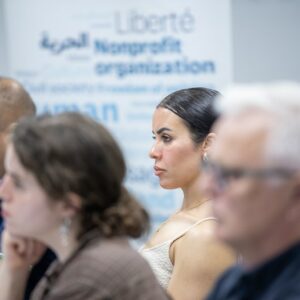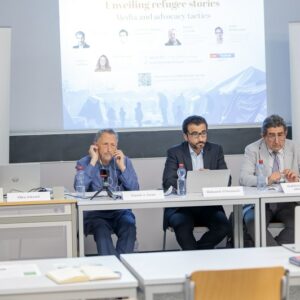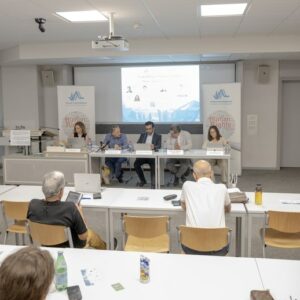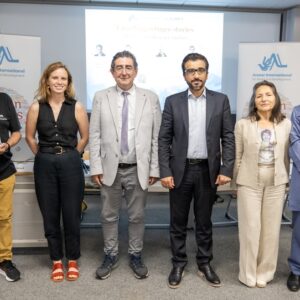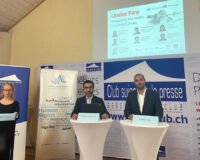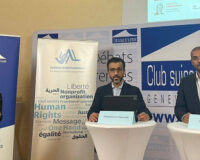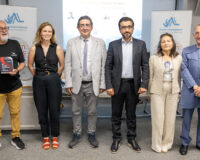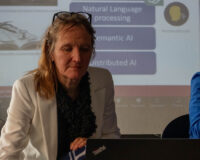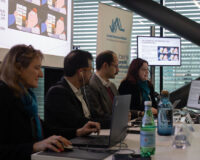“Unveiling Refugee Stories: Media & Advocacy Tactics” Panel Event
Geneva, 28 June 2024
The dynamic, hybrid expert event “Unveiling Refugee Stories: Media & Advocacy Tactics” took place 28 June at the University of Geneva with participation in person and online of media professionals, development experts, legal practitioners, civil society solidarity actors, and persons with refugee experiences. Participants represented a diversity of more than four regions including Africa, Europe, Middle East and South America. Three expert presentations and two refugee experience stories outlined challenges faced by refugees, displaced persons, victims of armed conflict as well as migrants generally and discussed remedies, directions for advocacy efforts and development initiatives addressing those challenges. The panel presentations spurred interactive discussion with audience participants continuing until the conference room closed for the night. The event underscored the importance of collaborative efforts among media professionals, policymakers, legal experts, and civil society to create a more inclusive and supportive environment for refugees and other migrants globally.
The event was organized and hosted by Jusoor International for Media and Development, in supportive partnership with Global Migration Policy Associates (GMPA) and the International Organization for Democracy and Human Rights (IODHR).
Key Takeaways and Recommendations
Responsible and Respectful Media Coverage: The need for responsible journalism that provides accurate and empathetic coverage of refugee and migrant stories as well as international mobility that enables protection of rights, solidarity and inclusion.
Supportive Law and Policies: The importance of international conventions and their domestic implementation along with national policies that protect refugee and migrants’ rights and promote their integration with and contributions to host societies.
International Cooperation: The necessity of international solidarity and cooperation globally to address the root causes of forced displacement and support countries hosting large refugee populations.
Amplifying Refugee Voices: The power of personal narratives in humanizing refugees and influencing positive change –notably human rights protection including legal recognition and protection for refugees in all countries.
——-
MOHAMED AL HAMMADI IS A JOURNALIST, WRITER, SPEAKER, AND EXPERT IN MEDIA ISSUES AND INTERNATIONAL RELATIONS.
HE IS THE FOUNDER AND PRESIDENT OF JUSOOR INTERNATIONAL CENTER FOR MEDIA AND DEVELOPMENT AND CURRENTLY SERVES AS THE EDITOR-IN-CHIEF OF JUSOORPOST.
HIS PAST ROLES INCLUDE EDITOR-IN-CHIEF OF AL ITTIHAD NEWSPAPER, NATIONAL GEOGRAPHIC MAGAZINE (ARABIC VERSION), AND AL ROEYA NEWSPAPER, AS WELL AS EXECUTIVE DIRECTOR OF EDITING AND PUBLISHING AT ABU DHABI MEDIA COMPANY.)
Media Role and Challenges:
Mr Al Hammadi discussed the significant role media plays in shaping public opinion and influencing policies related to refugees. He highlighted the challenges faced by journalists, including threats to press freedom and dangers in conflict zones. He emphasized the need for media to provide balanced coverage, counteract misinformation, and promote stories that humanize refugees. Al Hammadi also stressed the importance of encouraging media outlets to focus on refugee issues and the role of the United Nations in supporting these efforts.
- Media’s Influence: Al Hammadi underscored the significant role media plays in shaping public opinion and influencing policies related to refugees. He pointed out that while media has the power to advocate for refugee rights and raise awareness, it often falls short in doing so.
- Challenges: He highlighted various risks faced by journalists, including threats to press freedom and dangers encountered in conflict zones. Additionally, Al Hammadi addressed the increase in anti-refugee rhetoric on social media, which often portrays refugees negatively and incites xenophobia.
- UNHCR Reports: Citing United Nations High Commissioner for Refugees (UNHCR) reports, Al Hammadi discussed the growing number of refugees globally and the need for media to play a constructive role in fostering understanding and support for refugees.
- Case Studies: He presented case studies of media campaigns that successfully brought attention to refugee crises and mobilized international support, emphasizing the potential positive impact of responsible journalism.
- Call to Action: He emphasized the necessity for media outlets to provide balanced coverage, counteract misinformation, and promote stories that humanize refugees. He also called for international support to address the root causes of forced migration.
——–
PATRICK A. TARAN IS THE PRESIDENT OF GLOBAL MIGRATION POLICY ASSOCIATES (GMPA), AND COUNTS 50 YEARS OF WORK IN INTERNATIONAL MIGRATION, REFUGEE RESETTLEMENT, AND HUMAN RIGHTS, WORKING WITH GOVERNMENTS, INTERNATIONAL ORGANIZATIONS, CIVIL SOCIETY AND MIGRANT AND REFUGEE ORGANIZATIONS AROUND THE WORLD. PREVIOUS POSTS INCLUDE SENIOR MIGRATION SPECIALIST AT THE ILO AND SECRETARY FOR MIGRATION AT THE WORLD COUNCIL OF CHURCHES. HE HAS CO-AUTHORED 17 BOOKS AND OVER 200 PUBLICATIONS.)
Context of international migration, human rights and development challenges
Mr Taran provided a comprehensive overview of global migration trends, highlighting the integral role of refugees and displaced persons within this context. He discussed the economic contributions of migrants, the aging workforce in many countries, and the need for international mobility to sustain global and national economies. Taran outlined a ten-point agenda for media narrative and policy action, emphasizing the protection of migrants’ rights, the importance of legal frameworks, and the necessity of inclusive policies.
- Global Migration Context: Taran provided a comprehensive overview of the global migration landscape, noting that refugees and forced displacement are integral components of current international mobility trends. He emphasized the critical role migrants play in the economies of host countries.
- Economic Impact: Taran highlighted the economic contributions of migrants, noting that they fill essential roles in labor markets worldwide. He discussed the economic value generated by migrants and the challenges posed by aging workforces in many countries.
- Enable mobility and protect migrants: Taran outlined the economic and social justice imperatives for law and policies that enable human mobility and address workforce needs through migration and immigration while respecting and enforcing international labour standards.
- Policy Recommendations: Taran outlined a Ten Point Agenda for media narratives and policy actions, including ensuring legal protections for refugees and migrants, nondiscriminatory treatment, and facilitating inclusion and integration support.
- Urgent Needs: He stressed the urgent need for international cooperation and solidarity to support countries with significant refugee populations, such as Jordan and Lebanon.
——–
PROF. DR. H.C. MEHMET ŞÜKRÜ GÜZEL IS THE FOUNDER AND PRESIDENT OF THE CENTER FOR PEACE AND RECONCILIATION STUDIES (CPRS). HIS RESEARCH FOCUSES ON DECOLONIZATION, INTERNATIONAL TERRORISM, GENOCIDE, AND PEACEBUILDING. HE HAS AUTHORED SIX BOOKS AND NUMEROUS ACADEMIC ARTICLES AND HAS BEEN NOMINATED FOUR TIMES FOR THE NOBEL PEACE PRIZE.
Legal and Policy Frameworks
Mr Güzel discussed legal protections for refugees and the roles of legal experts in advocating for refugee rights. He highlighted the importance of civil society and local authorities in supporting refugee initiatives and the need for effective policy collaboration to uphold refugees’ rights. Güzel emphasized the role of international accountability in addressing the impacts of conflicts, particularly those involving use of prohibited weapons and munitions.
- Legal Protections: Dr. Güzel focused on the legal frameworks that protect refugees, highlighting the 1951 Refugee Convention and the 1967 Protocol.
- Role of Legal Experts: He discussed the crucial role legal experts play in advocating for refugee rights and ensuring that laws and policies are effectively implemented.
- Challenges in Implementation: Dr. Güzel addressed the challenges in implementing legal protections, including bureaucratic hurdles, lack of resources, and political resistance. He called for stronger international mechanisms to ensure compliance.
- Civil Society and Local Authorities: He emphasized the importance of civil society organizations and local authorities in advocating for refugee rights and collaborating on effective policy implementation.
MS JENNY BETTANCOURT IS A HUMAN RIGHTS ACTIVIST ORIGINALLY FROM CHILE, RESIDENT IN GENEVA SINCE 1978. ACTIVE IN ENVIRONMENTAL WORK FROM A YOUNG AGE, SHE AND HER FAMILY FACED PERSECUTION AFTER THE ENFORCED DISAPPEARANCE OF HER BROTHER IN LATE 1973. HER WORK OVER FOUR DECADES IN GENEVA HAS FOCUSED ON FINDING THE TRUTH OF THE FATE OF HER BROTHER AND ON PROMOTING ELABORATION, ADOPTION AND SUBSEQUENT RATIFICATION AND IMPLEMENTATION OF THE INTERNATIONAL CONVENTION ON ENFORCED DISAPPEARANCES.)
Personal Narrative, impact of repression and impeded access to asylum
Ms Bettancourt shared her personal experiences, detailing the challenges her family faced under the Pinochet military dictatorship, her escape from Chile, and her journey to Geneva in search of asylum. She discussed the role of the media in situations of conflict and repression, the difficulties encountered while seeking refugee-asylum protection in Switzerland, and her ongoing work with organizations dedicated to human rights, the memory of the disappeared, and the implementation of the core UN International Convention for the Protection of All Persons from Enforced Disappearance (2010).
- Personal Testimony: Ms Bettancourt shared her harrowing personal experiences following the military coup that overthrew the elected government in Chile in 1973, the forced disappearance of her brother, and the subsequent threats her family faced in the widening repression under the Pinochet military regime.
- Role of Media: She highlighted the role media played in conflict, particularly in situations of repression by military regimes and how it influenced public perception and policy, for example by villifying regime opponents and justifying State brutality. Ms Bettancourt stressed the vital role and responsibility of media in uncovering and disseminating the truth about human rights abuses as well as in encouraging solidarity with refugees.
- Seeking Asylum: Ms Bettancourt recounted her journey seeking asylum and the bureaucratic challenges she encountered leading to denial of refugee protection for several years. She discussed the emotional and psychological toll of displacement and of denial of legal protection on refugee individuals and families.
- Advocacy for Justice: She spoke about her advocacy work to seek justice for her brother and other victims of the former military regime in Chile, emphasizing the need for international solidarity in addressing human rights violations. She also spoke of the importance of obtaining the international convention on enforced disappearances and need to implement it in many countries.
- Empowerment through Storytelling: Ms Bettancourt encouraged the use of personal narratives in media to humanize the refugee experience and foster empathy and solidarity. She advocated for platforms that amplify refugee voices and stories to influence policy and public opinion.
——–
ELLEN ACKROYD IS THE PROJECT OFFICER FOR EMERGENCY AND CRISIS PREPAREDNESS AND RESPONSE AT THE INTERNATIONAL COMMITTEE OF THE RED CROSS (ICRC). SHE HAS EXTENSIVE EXPERIENCE IN REFUGEE INTEGRATION AND RECEPTION POLICIES, HAVING WORKED IN VARIOUS CAPACITIES, INCLUDING FOUNDING AN ORGANIZATION DEDICATED TO PROVIDING LANGUAGE CLASSES TO NEWLY ARRIVED REFUGEES IN AMSTERDAM AND SUPPORTING MIGRANT COMMUNITIES IN CALAIS, FRANCE.
Moderator
Ms Ackroyd facilitated the discussion, guiding the panelists through various topics
and ensuring a comprehensive exploration of the issues at hand. Her focus on
human rights and the impacts of conflict provided a solid foundation for the
discussion.
The panel event successfully highlighted the complex challenges faced by refugees and the critical roles that media, legal frameworks, and development policies play in addressing these issues. The discussions underscored the importance of responsible journalism, supportive legal frameworks, and international cooperation in fostering a more inclusive and supportive environment for refugees and other migrants.
We invite you to stay engaged with these important issues by following Jusoor International and our partners. Join us in our efforts to amplify refugee voices, advocate for their rights, and foster global solidarity. Keep an eye out for upcoming events and initiatives where you can contribute to making a difference.



